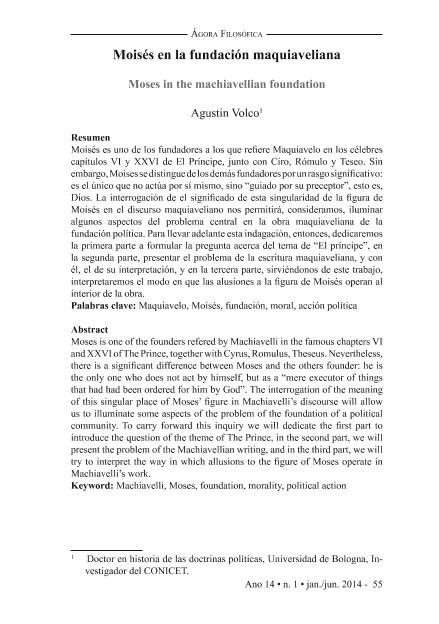Mostrar el registro sencillo del ítem
dc.contributor.author
Volco, Agustin

dc.date.available
2018-02-06T14:47:59Z
dc.date.issued
2014-06
dc.identifier.citation
Volco, Agustin; Moisés en la fundación maquiaveliana; Universidade Católica de Pernambuco. Departamento de Filosofia; Ágora Filosófica; 2014; 1; 6-2014; 55-89
dc.identifier.issn
1679-5385
dc.identifier.uri
http://hdl.handle.net/11336/35753
dc.description.abstract
Moisés es uno de los fundadores a los que refi ere Maquiavelo en los célebres capítulos VI y XXVI de El Príncipe, junto con Ciro, Rómulo y Teseo. Sin embargo, Moises se distingue de los demás fundadores por un rasgo significativo: es el único que no actúa por sí mismo, sino “guiado por su preceptor”, esto es, Dios. La interrogación de el significado de esta singularidad de la fi gura de Moisés en el discurso maquiaveliano nos permitirá, consideramos, iluminar algunos aspectos del problema central en la obra maquiaveliana de la fundación política. Para llevar adelante esta indagación, entonces, dedicaremos la primera parte a formular la pregunta acerca del tema de “El príncipe”, en la segunda parte, presentar el problema de la escritura maquiaveliana, y con él, el de su interpretación, y en la tercera parte, sirviéndonos de este trabajo, interpretaremos el modo en que las alusiones a la fi gura de Moisés operan al interior de la obra.
dc.description.abstract
Moses is one of the founders refered by Machiavelli in the famous chapters VI and XXVI of The Prince, together with Cyrus, Romulus, Theseus. Nevertheless, there is a signifi cant difference between Moses and the others founder: he is the only one who does not act by himself, but as a “mere executor of things that had had been ordered for him by God”. The interrogation of the meaning of this singular place of Moses’ fi gure in Machiavelli’s discourse will allow us to illuminate some aspects of the problem of the foundation of a political community. To carry forward this inquiry we will dedicate the fi rst part to introduce the question of the theme of The Prince, in the second part, we will present the problem of the Machiavellian writing, and in the third part, we will try to interpret the way in which allusions to the fi gure of Moses operate in Machiavelli’s work.
dc.format
application/pdf
dc.language.iso
spa
dc.publisher
Universidade Católica de Pernambuco. Departamento de Filosofia
dc.rights
info:eu-repo/semantics/openAccess
dc.rights.uri
https://creativecommons.org/licenses/by-nc-sa/2.5/ar/
dc.subject
Maquiavelo
dc.subject
Moisés
dc.subject
Fundación
dc.subject
Moral
dc.subject
Acción Política
dc.subject.classification
Ciencia Política

dc.subject.classification
Ciencia Política

dc.subject.classification
CIENCIAS SOCIALES

dc.title
Moisés en la fundación maquiaveliana
dc.title
Moses in the machiavellian foundation
dc.type
info:eu-repo/semantics/article
dc.type
info:ar-repo/semantics/artículo
dc.type
info:eu-repo/semantics/publishedVersion
dc.date.updated
2018-02-05T20:21:56Z
dc.journal.volume
2014
dc.journal.number
1
dc.journal.pagination
55-89
dc.journal.pais
Brasil

dc.journal.ciudad
Recife
dc.description.fil
Fil: Volco, Agustin. Consejo Nacional de Investigaciones Científicas y Técnicas; Argentina. Universidad de Bologna. Universidad de Bologna - Sede Bs.as.; Argentina
dc.journal.title
Ágora Filosófica
dc.relation.alternativeid
info:eu-repo/semantics/altIdentifier/url/http://www.unicap.br/ojs/index.php/agora/article/view/483
Archivos asociados
